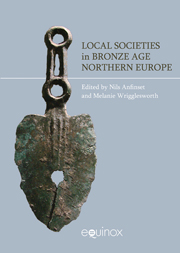Book contents
- Frontmatter
- Contents
- List of figures and tables
- Contributors
- Acknowledgements
- Introduction: local societies, regions and processes of cultural interaction in the Bronze Age
- PART I IDENTITY, GRAND NARRATIVES AND NETWORKS
- PART II REGIONS, GLOBALIZATION AND RESISTANCE
- 7 Northwestern Russia at the periphery of the north European and Volga-Uralic Bronze Age
- 8 Local centres in the periphery: the Late Neolithic, Bronze Age and Early Metal Age in Finland
- 9 The Nordic Bronze Age and the Lüneburg culture: two different responses to social change
- 10 Pottery, transmission and innovation in Mälardalen
- 11 Social landscapes of Bronze Age Scandinavia
- 12 The origin of a Bronze Age in Norway: structure, regional process and localized history
- 13 Social response or resistance to the introduction of metal? Western Norway at the edge of the “globalized” world
- Index
7 - Northwestern Russia at the periphery of the north European and Volga-Uralic Bronze Age
from PART II - REGIONS, GLOBALIZATION AND RESISTANCE
- Frontmatter
- Contents
- List of figures and tables
- Contributors
- Acknowledgements
- Introduction: local societies, regions and processes of cultural interaction in the Bronze Age
- PART I IDENTITY, GRAND NARRATIVES AND NETWORKS
- PART II REGIONS, GLOBALIZATION AND RESISTANCE
- 7 Northwestern Russia at the periphery of the north European and Volga-Uralic Bronze Age
- 8 Local centres in the periphery: the Late Neolithic, Bronze Age and Early Metal Age in Finland
- 9 The Nordic Bronze Age and the Lüneburg culture: two different responses to social change
- 10 Pottery, transmission and innovation in Mälardalen
- 11 Social landscapes of Bronze Age Scandinavia
- 12 The origin of a Bronze Age in Norway: structure, regional process and localized history
- 13 Social response or resistance to the introduction of metal? Western Norway at the edge of the “globalized” world
- Index
Summary
Introduction
Archaeological sites of the Bronze Age (c. 2000–500 BCE) in northwestern Russia have been poorly studied. The period is represented by few settlements and single finds. At some settlements from that period, traces of bronze casting have been revealed. There are few metal objects from the Bronze Age in northwestern Russia. Despite the relatively poor amount of evidence available at present, we are able to define the general contours of local metal production and to establish its chronology and external connections.
The problems of the Bronze Age and the character of sites throughout the vast areas of northern Europe from central Sweden as far as the Volga-Kama region, including northwestern Russia, were first discussed by Tallgren (1937). Tallgren introduced the term “Arctic Bronze Age” and described its basic features, with the general use of tools made from stone and bone, while bronze was rare. The population were hunting and fishing with a semi-nomadic life, and were involved in trade with foreign merchants. Soviet scholars only partly supported Tallgren's hypotheses. Gurina (1961) later introduced the term “Early Metal Age”, uniting the Bronze Age and early Iron Age. In my opinion, Tallgren's terminology corresponds better to the historical realities, and we must admit that the Bronze Age really existed in northwestern Russia, but the archaeological remains of that period are scarce as the level of the development of metal production is low compared with the neighbouring areas.
- Type
- Chapter
- Information
- Local Societies in Bronze Age Northern Europe , pp. 129 - 147Publisher: Acumen PublishingPrint publication year: 2012

